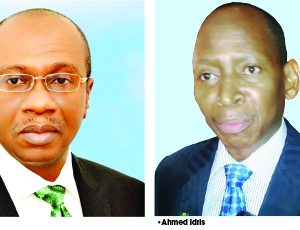On February 14, 2017, the Accountant-General of the Federation (AGF), Ahmed Idris, broke the news that the Federal Government had raked in about N5.244 trillion into the Treasury Single Account (TSA) since it flagged off the scheme about a year ago.
He added that the scheme had also helped to weed out more than 20,000 hitherto multiple bank accounts spread across various Deposit Money Banks (DMBs).
Idris however, capped his speech by saying that the TSA had taken the government out of the era of indiscriminate borrowings by MDAs and saved it an average of N4.7 billion monthly.
Idris’ revelations, though soothing, have been analysed by finance experts, who insist it was too early to rejoice over the whopping sum because capturing funds is one thing, while its judicious application, especially in an economy neck-deep in recession, is another.
As the Federal Government plans to borrow N2.32 trillion to partly fund the 2017 budget deficit estimated at N2.36 trillion which about 2.18 per cent of the country’s Gross Domestic Product (GDP), economic analysts say it can look inwards and see how the swelled TSA can help, since a lot of dormant funds, though meant for the Ministries Departments and Agencies (MDAs), lie there. They noted that such ‘idle funds’ should not be left to warm government’s account but channelled into infrastructural renewal projects.
The TSA, a public accounting system using a single account, or a set of linked accounts by government to ensure all revenue receipts and payments are done through a Consolidated Revenue Account (CRA) at the Central Bank of Nigeria (CBN), remains one of forgotten government policies that hitherto existed only in dusty archives.
Section 80 (1) of the 1999 Constitution as amended, states that, “All revenues, or other moneys raised or received by the Federation (not being revenues or other moneys payable under this Constitution or any Act of the National Assembly into any other public fund of the Federation established for a specific purpose) shall be paid into and form one Consolidated Revenue Fund of the Federation.”
Despite the existing law, there had been this perennial flagrant disregard to the provision of the constitution, as MDAs kept multiple accounts with commercial banks, thus making it hard for the government to effectively trace its funds.
Although all monies earned by the Federal Government through Value Added Tax (VAT), Customs duties, Immigration and other charges, are supposed to be paid into the Consolidated Revenue Account (CRA), a few exceptions border on accounts operated by joint venture partners with government, like Oil Mining Leases (OMLs) in the oil and gas industry.
However, when harsh economic realities hit the country, following the global crash in crude oil prices, managers of the nation’s economy were forced to marshal out strategies on how to fully capture and manage government’s revenues.
Consequently, former President Goodluck Jonathan administration introduced the TSA in 2012 using a unified structure of accounting for 217 MDAs. But analysts say the government, at that time, lacked the political will and firmness to ensure its success.
But, on August 9, 2015, President Muhammadu Buhari ordered all MDAs to immediately fully migrate to the TSA scheme. It means DMBs are allowed to maintain revenue collection accounts for MDAs, but all collections must be remitted to the CRA at the end of every banking day; that is MDAs’ accounts with DMBs must be at zero balance at the end of every banking day.
According to the AGF, the TSA allows government banking to be unified, as it enables the relevant stakeholders such as the Ministry of Finance and AGF to have full oversight of all cash flows across different bank accounts. He added that the scheme helps check incidence of multiple accounts operated by government MDAs for collection and spending of government revenues.
Idris gave the different TSA account types to include main account, subsidiary or sub-account, transaction account, zero balance account, imprest account, transit and correspondence accounts for different transaction purposes.
Though one of the fundamental benefits of TSA is that it will help check incidence of idle cash lying over extended periods in bank accounts held by spending MDAs while government continues to borrow to execute its budgets,
experts are worried that same may happen to the N5.244 trillion currently lying idle with the CBN.
They insist the government should spur the MDAs to function optimally so that more money is released into the system by way of major infrastructural project all in a bid to help reflate the economy.
On his part, the AGF, Ahmed Idris, said the TSA needs to go beyond mere cash management. “We should explore the inherent potential of TSA and identify most economically viable options of resources utilisation and deployment particularly under the present economic recession,” he said.
An economic analyst and Social Justice Crusader, Eze Onyekpere, said although N5.244 trillion has been realised from the TSA, the money is not a floating fund.
Rather, he said there was need for the government to galvanise the MDAs to function optimally so that some of the economic deficits could be tackled.
“The money in TSA is not some floating money. It’s also not new funds as some people are trying to insinuate. It’s money appropriated for. But as we’re curtailing wastages, we are still running huge deficits. This shouldn’t be. Our borrowing is still large and it shouldn’t be,” he said.
Source: The Sun
This page has been viewed 364 times


























